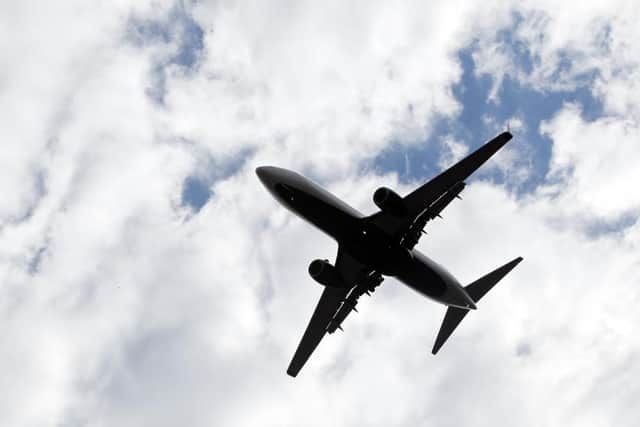Do I need a negative Covid test to enter Scotland? New travel rule explained - and if you have to self isolate
All international passengers arriving into the UK will be required to show a negative Covid-19 test before entering.
Those travelling by plane, train or boat - including UK nationals - will have to take a test up to 72 hours before they travel.
Advertisement
Hide AdAdvertisement
Hide AdAnd anyone who arrives in the country and does not have proof of a negative test could face a hefty £500 fine.


Here’s everything you need to know about the new rule - including why it has been introduced.
Will I need a negative test before entering the UK?
Everyone entering the UK from an international destination will have to take a coronavirus test before they travel.
The test should be taken up to 72 hours before they leave the country they are staying in.
Proof of the test will be needed when they check-in at the airport, train station or ferry before they embark.
And those who refuse to take a test won’t be allowed to travel at all.
The new testing rule will be UK wide, although non-essential travel to or from Scotland is already illegal.
Scottish Transport Secretary Michael Matheson said: “Travel into or out of Scotland is currently illegal and that will remain the case while we work to suppress the new strain of COVID-19.
Advertisement
Hide AdAdvertisement
Hide Ad“The Scottish Government has been consistently clear about the risks associated with international travel and the importance of public health measures in helping to stop the spread of coronavirus.
“That is why we have been in regular dialogue with the UK Government and the other devolved administrations about what further measures can be put in place, including the introduction of pre-departure testing (PDT).”
Echoing his statement, UK Transport Transport Secretary Grant Shapps said travellers coming into the UK "can't board... without having that negative test".
When do the rules come in?
There is not yet a definitive date for when the new testing rule will come into effect in Scotland, but government officials said the public health requirement would be “introduced as soon as practically possible”.
First Minister Nicola Sturgeon suggested during her daily coronavirus briefing on Friday 8 January that the new rule would come into effect from the end of next week.
Grant Shapps told LBC that the testing rule will be introduced in England next week “likely on Wednesday or Thursday” (13 or 14 January).
He said details of how to get tests abroad will be published on the UK Government’s website.
Are there any exceptions to the rule?
There is a limited number of exemptions to the UK-wide rule.
Advertisement
Hide AdAdvertisement
Hide AdThis includes hauliers, children under 11 and those travelling from countries without the infrastructure to deliver tests.
Arrivals from the Common Travel Area with Ireland will also be exempt.
Will I still have to self-isolate?
All passengers who arrive from countries which are not on the government’s travel corridor list will still have to self-isolate for 10 days - no matter what their test result is.
Tests will still be required even if passengers are coming from somewhere where they do not have to quarantine.
Michael Matheson explained: “It is important to emphasise that this additional measure does not remove the requirement for all passengers arriving from countries not on the quarantine exemption list to self-isolate for ten days, even with a negative test.
“Likewise, all passengers will continue to have to complete a Passenger Locator Form and, of course, they will be subject to national lockdown restrictions, which currently bar people from leaving their home or other fixed address without a reasonable excuse for doing so.”
Why has the rule been introduced?
The new testing rule has been introduced due to fears over new strains of coronavirus.
Grant Shapps said there are “concerns” about the new South African variant in particular, and whether the vaccines will work against it.
Advertisement
Hide AdAdvertisement
Hide AdSpeaking about the international travel testing, he told Sky News: “This is an extra check and we’re doing this now because there are these variants that we’re very keen to keep out of the country, like the South African variant, for example.
“There are the concerns about the South African one in particular, about how effective the vaccine would be against it, so we simply cannot take chances. So today because of that variant it has become much more urgent.”
He said that the South African strain was “worrying experts” because the vaccines may not respond in the same way.
Mr Shapps told LBC: “And if that were the case it would be a tragedy to allow that into the country.
“It’s much more urgent and pressing than just the, if you like, coronavirus, the classic version already here, when one or two more cases doesn’t change things dramatically. The new variant could be a big gamechanger and we don’t want to see that and that’s why now.”
A Scottish government spokesman said: "The new public health requirement, to be introduced as soon as practically possible, aims to strengthen current safeguards against imported cases and in particular protect against new strains of coronavirus such as those identified in Denmark and South Africa.”
However, new research has shown that the Pfizer vaccine does in fact protect against the new UK strain and the South African variant.
The study has not yet been peer-reviewed, but it found that 20 people who had received the vaccine had antibodies that worked against the new strains.
